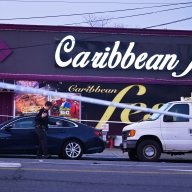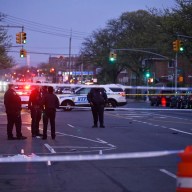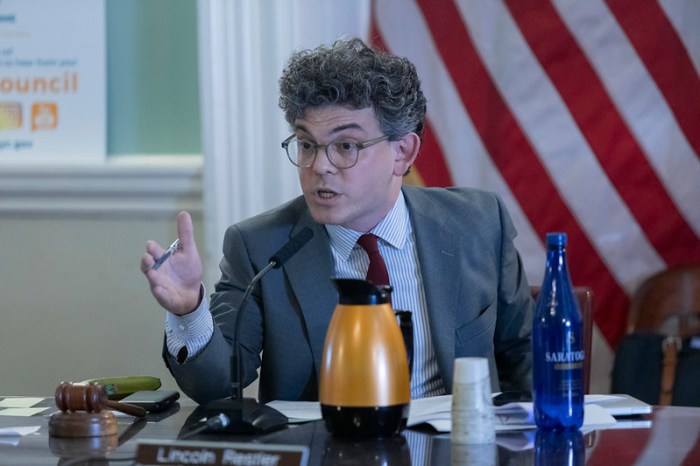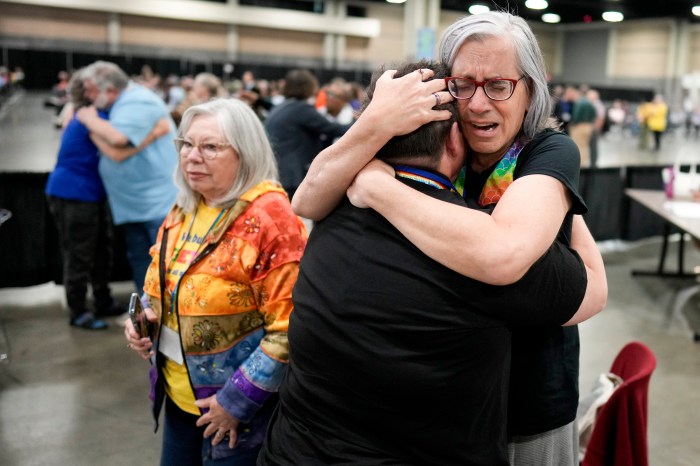By Joe Maniscalco
Explosive. That’s the best way to describe the results of the new Manhattan Beach zoning study, and no one has even read it yet. City Councilmember Mike Nelson shocked many in the community last November when he announced that the study was being conducted with the help of the Borough President’s Office. The controversial zoning study was completed in December, but members of the Manhattan Beach Community Group (MBCG), meeting at P.S. 195 on Irwin Street last week, complained that they still had not been given the opportunity to review the document. “It’s in limbo somewhere,” MBCG Zoning Committee Chair Fran Olk said. “We’ve not been allowed to see it. We don’t know what’s going to be done with the study.” The zoning study is supposed to be a review of the community’s current housing stock. Nelson said that he decided to initiate the survey with Borough Hall’s help, in response to repeated requests from some Manhattan Beach homeowners. Residents of the tiny affluent community located between West End Avenue and Pembroke Street have been divided for months over the numerous construction projects currently underway throughout the community that have been found to be in violation of the building code. During that time, those unable to complete their construction projects due to non-compliance have been seeking a way out short of having to dismantle their offending structures. Other homeowners insist that those in violation of the building code must adhere to the letter of the law. “If things need to be bigger, there are legal means in which to do that,” Olk said. “If buildings are not legal, they’re probably going to have to move somewhere where it is legal.” Many MBCG members fear Nelson’s zoning study is just the first step in rezoning Manhattan Beach and legalizing larger homes constructed illegally. “I will not fight to legalize anything,” Nelson told the Bay News this week. “I’m the guy who downzones.” Nelson said that he has not yet read the results of the zoning study, but said they are available at Borough Hall for “all interested parties” to go and read it. “The borough president has it,” Nelson said. “I think he can easily put it into hard copy.” Opponents of the zoning study charge that the petition some Manhattan Beach homeowners compiled in an effort to get Nelson to initiate the study was dubious, containing many invalid signatures. Several MBCG members – including Vice-President Ira Zalcman – said that their names somehow appeared on the petition even though they never even saw the document and didn’t sign it. “It’s confounding why Nelson accepted this,” Olk said. But Nelson maintains that he based his decision to initiate the study on other factors besides the petition, and that the study could help to bring about “better zoning” for Manhattan Beach. “It’s so confusing now,” he said. “Does this house make the cut, or doesn’t it make the cut? We’re just looking at the possibility of normal guidelines for Manhattan Beach.” MBCG previously voted not to change zoning regulations in their neighborhood. Olk argued that existing regulations are “fine as they stand.” “We have laws and codes on the books, but the city never enforced them,” she said. Nelson, however, said that the community might benefit from the zoning study in other ways as well. “As of right, you can build two- and three-family homes [in some areas of the community], and nobody wants that,” Nelson said. At least one MBCG member brought up the same point at January’s meeting held at P.S. 195. “That’s why we want to see a copy of the study,” Zalcman insisted. Nelson, who was present at the January meeting held at P.S. 195 but did not address the zoning study, said he did so at the request of MBCG President Ronald Biondo, who reportedly suggested that the councilman “hold off.” Nelson said he was asked to request a study from the Department of City Planning but refused, fearing that the results of such a study would be “forced down our throats.” MBCG now plans on retaining an independent zoning expert to examine the Borough Hall study completed in December. Arthur Gershfeld, the leading advocate for the Manhattan Beach residents supportive of the zoning study, argued that an independent consultant was not necessary, and that the MBCG’s executive board was attempting to “isolate” residents who didn’t agree with them. Zalcman tried to calm the increasingly contentious meeting saying, “When it’s all said and done, we are neighbors…and hopefully, we’ll continue to be neighbors.”

































